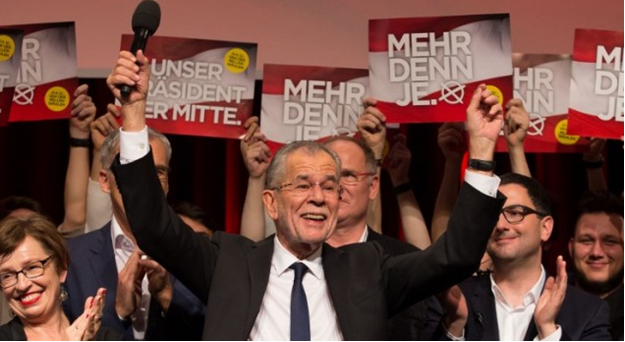
LONDON: The June referendum in which Britain voted to leave the European Union, and Donald Trump’s victory in the November 2016 American presidential election, were massive right-wing political earthquakes.
Those who predicted aftershocks, this time in Austria’s presidential election and Italy’s constitutional referendum, thought that they were on safe ground in assuming that the right would triumph there, too.
Instead, the far right in Austria suffered a shock defeat. Independent candidate and former leader of the Green Party, Alexander Van der Bellen, beat the Freedom Party candidate, Norbert Hofer, by a margin of 53.3% – 46.7%. In May, Bellen had won by a tiny margin of 31000 votes, but the result was annulled by Austria’s highest Constitutional Court. Then, the judges found that although there was no fraud, thousands of absentee votes had been counted too early, influencing the main vote. And the court ordered that the election be held again.
In Italy, Prime Minister Matteo Renzi had called a constitutional referendum to curtail the powers of devolved regional governments and reduce the size of the Senate, arguing that these measures would reduce bureaucracy. Renzi suffered a heavy defeat and resigned as he had said before the vote. The outcome, however, did not cause the shock to the Italian system that many had predicted.
Britain’s right-wing press had made much about a new crisis for the euro and the stock markets if Renzi lost the referendum. In the event, Italy and the EU took Renzi’s departure in their stride. The truth is that governments in post-war Italy come and go frequently. Prime Minister Renzi’s was the latest. Italy’s economic and industrial decline has been going on since the end of World War II, with no real growth over the last twenty years. What was new and unexpected this time? It was business as usual for Italy.
The United Kingdom sees developments in mainland Europe very differently from Europeans themselves. So deep is the hostility against the European Union and its leading members, Germany and France, that diehard opponents on Britain’s political left and right will go to any extent to try to prove that the EU project is collapsing.
There are two different realities in mainland Europe. The far right, fervidly opposed to the idea of the European Union, has been on the rise for a number of years. But now support for the EU is also rising in many member-states, particularly in the wake of the Brexit vote in the United Kingdom.
That the far right poses a serious challenge for established parties throughout Europe is not in doubt. Nonetheless, Britain’s vote to leave the EU, the anti-Europe rhetoric and the prevailing uncertainty, all appear to have generated a new consciousness across the continent. The European Union may have its faults. But many of those who have been working for its disintegration in the name of nationalism and sovereignty are far from serious politicians who have credible alternatives to offer.
Austria’s newly-elected president, Van de Bellen, fought on the slogan: “Those who love their country do not divide it.” The result of the re-run is evidence that the new post-Brexit reality, and the forethought of what might happen to Austria in the event of a far-right victory, evidently changed the hearts and minds of many voters.
Other worries also concentrated the minds of Austrians in the event Norbert Hofer won the presidency. The post is largely ceremonial, but what if Hofer exercised his constitutional right to appoint a prime minister, and that person was from the fringe? Austria has been a liberal democracy since the devastation in two world wars in the last century. The prospect of upheaval threatening the country’s stability and prosperity was not something Austrians wanted to contemplate again.
Continuing arrival in Europe of great many refugees escaping Middle East wars, in which the West has played its own part, have helped create favourable conditions for the far right. But to many Austrians, a far-right takeover is a frightening prospect for their country which, along with Germany, still grapples with its history of fascism and World War II.
That history reminds us of the rise and fall of a great empire and the destruction wrought by extremist politics. So the Austrian people drew back from that prospect and elected Van der Bellen, a mild-mannered academic, who expressed faith in the country’s liberal parliamentary democracy.
Will the tide now turn against right-wing extremist groups in other countries? France, Germany and the Netherlands are among European Union states due to have elections in 2017. In France, the current Socialist President Francois Hollande, facing a humiliating defeat, has announced that he would not stand for re-election next year. The contest to succeed Hollande will almost certainly be between Francois Fillon, ex-prime minister, who recently won the Republican presidential primary, and Marine Le Penn, leader of the far-right French National Front. Opinion polls suggest that Fillon will easily overcome the challenge from Marine Le Penn.
In Germany, Chancellor Angela Merkel is seeking a fourth term. Despite criticisms of her decision to allow hundreds of thousands of refugees, Merkel remains popular among Germans. And her role is central to the success of the European Union and Germany’s leadership role.
The year 2016 has certainly produced big surprises, and it would be reckless to make predictions about the coming year. The best which can be said at this point is that even though support for the political right is causing alarm among established parties, far right nationalism has probably reached a peak from where it is unlikely to climb up much further.
(Deepak Tripathi is a Fellow of the Royal Historical Society and of the Royal Asiatic Society of Great Britain and Ireland.)

